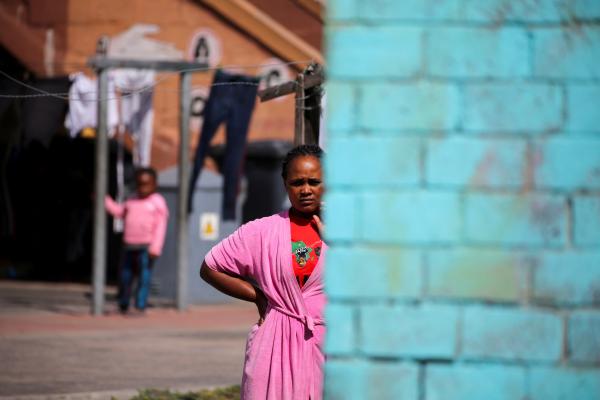In Lakeview, a Christian-dominated neighborhood in Johannesburg, South Africa, government officials are carrying out evictions, demolishing shacks, and making residents homeless during the coronavirus lockdown.
When residents saw police and more than 1,000 members of ‘Red Ants’ — a private security and evictions company contracted by the government — moving toward their neighborhood in April, they knew it wasn’t good news.
Although the mayor of Johannesburg, Geoff Makhubo, says the order targeted illegally built shacks and houses — not occupied homes. But residents in Lakeview said that 80 homes in their neighborhood were demolished. Not only were the residents rendered homeless, their food and belongings were also taken.
“We don’t have anywhere to go at the moment,” Nkhane Josa, one of the residents affected by the demolition, said. “We were surprised to see them [the Red Ants] when they arrived and the next thing they did was start pulling down our building and that of our neighbors despite begging them not to.”
Demolition amid a pandemic
South Africa is the epicenter of the pandemic on the continent. The first case of coronavirus was reported on March 5 after a South African returning from Italy tested positive. As of June 23, there are 106,108 cases with 2,102 deaths, according to the National Command Council on COVID-19 . A 21-day lockdown aimed at combating the coronavirus in the country began on March 27 with a subsequent 14 day extension.
And while the country is gradually relaxing lockdown restrictions and reopening of the economy, schools, and places of worship, the evicted residents say that the eviction was illegal and violated the lockdown rules by Justice Minister Ronald Lamola and President Cyril Ramaphosa.
The residents aren’t wrong.
President Ramaphosa banned evictions during the national lockdown . Also, a court earlier ruled that eviction of residents during the lockdown and without a court order was unlawful and unconstitutional.
But this didn’t stop the Red Ants from demolishing homes in Lakeview.
Before lockdown began, Johannesburg Organisation of Services to the Homeless [JOSH] – a nonprofit that addresses the challenges of homeless people in Johannesburg and the National Homelessness Network — a movement which helps prevent eviction and improve the conditions of homeless people, wrote a letter to Ramaphosa, expressing concerns over possible evictions and demanded specific response to homelessness in the event of a lockdown.
In a March 23 nationwide address, Ramaphosa responded and said that there were no plans to evict or demolish homes during the lockdown and that the homeless would be given temporal shelter and food. But this did not happen.
“I was very scared when I saw them coming with their trucks,” said Annie Paul, who was inside her shack on the day of the demolition. “Before I could pick up some of my stuff to leave, they had already started pulling the building down and in a matter of minutes, everything was gone. They didn’t allow us to pick anything.”
Paul said she’s disappointed the demolitions were carried out without any alternative provisions for her and her neighbors. An estimated 300 people were displaced.
“We are now homeless; I have lost everything,” she said.
“If the government had provided an alternative for the residents, by saying that they were moving people from a crowded area to a more spaced area, then that would have been justified," Fr. Nobert Munekani, a pastor at Holy Trinity Catholic Church said. “But if you are not providing an alternative then you are making many people more vulnerable than they were before — the government is unable to take care of homeless people that they have already.”
Rising cases of homeless people
South Africa has one of the highest rates of homeless people on the continent. As of 2015, there are an estimated 200, 000 homeless people living on the streets across the country. The province of Gauteng has some 50, 000 homeless people with 15, 000 in the city of Johannesburg alone.
Mary Gillet-de Klerk, who heads JOSH, says that the organization has been receiving increased phone calls from people who are facing eviction. According to Klerk, JOSH has been trying to get a physical shelter for more than seven years. They are looking at sustainable ways to provide support, housing, food, and skills to homeless people post-lockdown. But because they don’t have a shelter yet, Klerk says they direct them to temporary shelters where they can stay.
“The situation is going to get worse after the pandemic as people lose their jobs, businesses collapse, and people lose their livelihoods, too. So, we are trying to address this nationally, provincially, and at the local levels,” Klerk said.
The reasons for these demolitions still remain unclear. But the city, which has come under fire for the destruction of homes during the lockdown period, says the shacks were illegally built and that there has been increase of criminal activities taking advantage of the lockdown to invade the lands and engage in land grabs.
According to Munekani, it is difficult to tell because criminality is everywhere and not only those living in informal shelters and shacks.
“What makes people to engage in criminal acts in the first place is lack of jobs,” Munekani said. “Finding means of survival are what we be should be addressing because if there are no jobs that’s when people engage in criminal activities.”
And while the city agreed to stop the evictions and demolitions after the South African Human Rights Commission intervened, the damage is still present.
Josa now lives with a friend who took him in after the demolitions.
“It is very painful because this was happening when we were supposed to be on lockdown inside our homes. But they came and asked us to leave with our properties destroyed,” he said.
Many others whose homes were destroyed have similar stories. And while the government and organizations figure out how to move forward, the people who’s homes were destroyed in Lakeview still remain homeless.
Got something to say about what you're reading? We value your feedback!





